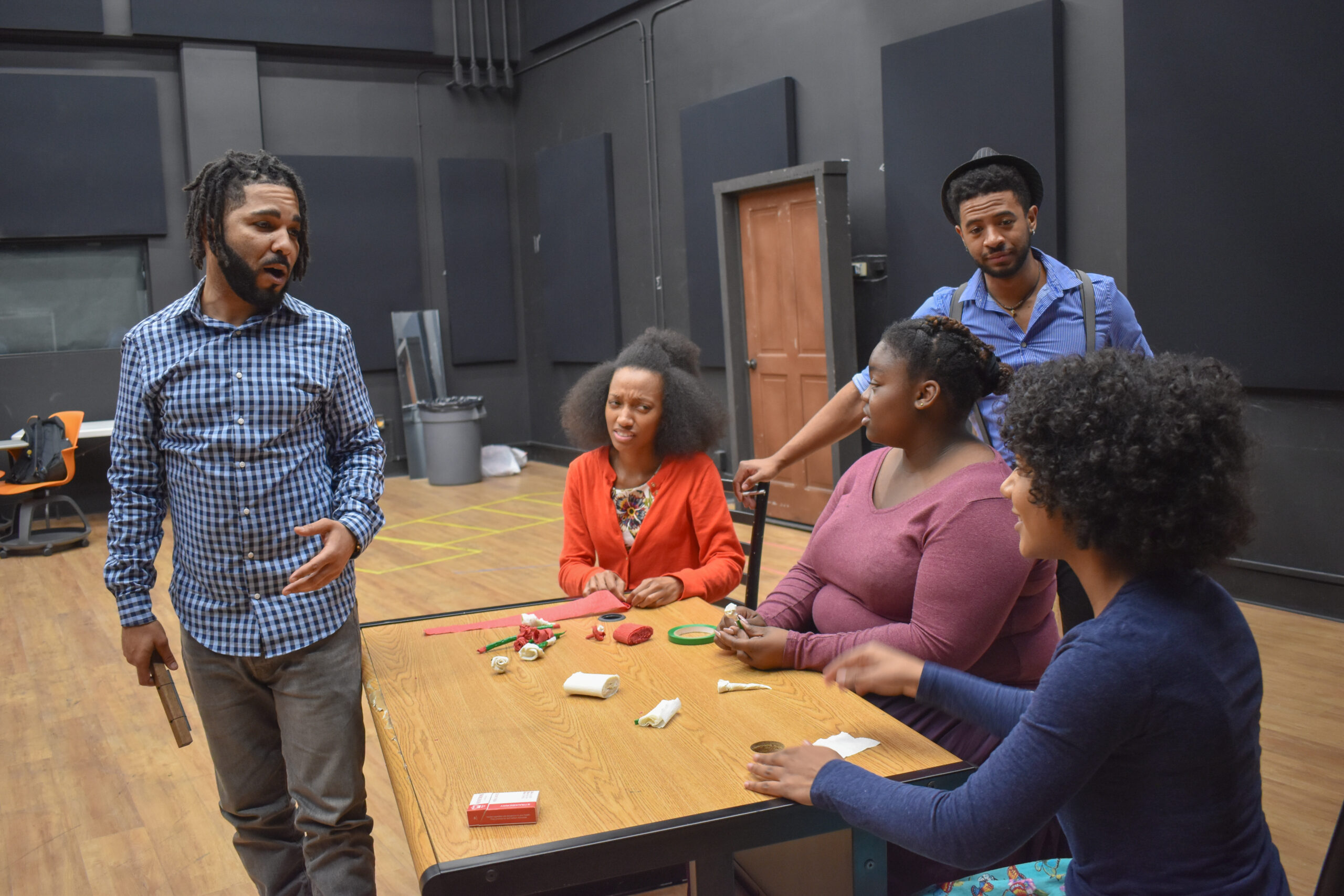Director Jozben Barrett (left) works with some of the cast from “Seven Guitars” (Clockwise from top): Jordan Hyman, Tevin Jackson (standing), Nisey Turner, and Irene Jones. Photo by Sarai Henriquez
By Sarai Henriquez
Culture Assistant
As a theater artist and an educator, one of Jozben Barrett’s driving focuses is to tell the untold, or under-told, stories of those who have long been denied the forum to express their voices.
And while “Seven Guitars,” his directorial debut at CSUDH, was written by August Wilson, one of the most prominent voices of color of the 20th Century, the opportunity to share Wilson’s words is something he is thrilled about–both for himself and his actors.
“August Wilson is a very prolific playwright, and an opportunity to direct one of his plays only comes along every so often [and] an opportunity to be in one of his plays [only] comes along every so often,” Barrett, a lecturer with the CSUDH Theatre and Art Department since 2017, said. “It was an opportunity that every black actor at CSUDH should have, or at least the opportunity to audition.”
The two-time Pulitzer Prize-winning Wilson was one of the most acclaimed American playwrights of the past 50 years. He was also one of the few playwrights of color to achieve success on Broadway (“Hamilton’s Lin Manuel Miranda was only 4 when Wilson’s first play ran on Broadway in 1984),
A poet and a playwright, Wilson, who passed away in 2005, was best known for his Pittsburgh Cycle, a 10-play series that documented the African American experience of the 20th Century. Each of the 10 plays was set in a different decade of the century, and all but one was set in Pittsburgh’s Hill District, where Wilson was raised
“Seven Guitars” is set in 1948. It is infused by one of the great influences in Wilson’s life, blues music, and, via flashbacks. centers on Floyd “Schoolboy” Barton, who has just been released from jail and finds that a song he recorded before incarceration has become a surprise hit and he’s asked to sign a record deal.
But issues of identity, the clash of rural and big-city values amid the Black Diaspora of the first half of the 20th Century, and the dynamic between Floyd and his circle of associates complicate his decision.
When Barrett was an undergrad student at Cal State Northridge, he felt that the plays he did were not relatable to him or other people of color. So he and a friend decided to stage Suzan-Lori Parks’ “Topdog/Underdog” for free to introduce people of color to the theater.
That experience, coupled with participating in a middle school English Language learner program during his second year of grad school at the California Institute of Arts School of Theater showed him his path.
“That’s when I believed in this model that theater can be used as a tool for change,” Barret said. After he graduated from grad school, he landed a job at a community arts partnership. He traveled to lower-served communities in Los Angeles and provided free art programs.
Since then, whether acting, directing, producing or educating, Barrett has focused on his mission to help people of all backgrounds find their voice and to tell the untold and under-told stories of alternative voices, whether they are plays from Black writers like Wilson, Latinx writers such as Nilo Cruz and his play “Anna in the Tropics,” or women writers like Yazmina Reza and her play “Art.”
“To have stories about black people, to have stories about brown people, where we see ourselves in these scenarios, is just as important as the discussion of having representation in Hollywood,” Barrett said.
His cast and crew have rehearsed “Seven Guitars” since December
“We are his prodigy, what he is teaching us I want to spread to others,” said Jordan Hyman, a guest actress in the play.
Barrett said he always makes sure that his students and actors are always having fun. He does not let them quit and helps them see the potential he sees in them.
“He has so many connections with so many wonderful people it speaks a testament [to] what kind of person he is,” said Blessing Oluwole, another member of the cast. “He is so genuine in himself as a human being that I just want to be able to always display the same type of energy.”
Barrett’s role in mentoring his cast is a throughline to his own mentor, a relationship that further strengthens his connection to Wilson.
Barrett’s mentor was the late actor James Avery who played “Uncle Phil” on “The Fresh Prince of Bel-Air.” He met Avery while at Cal Arts, when Avery was a visiting artist and a major influence in a student organization that Barrett co-founded, the Black Arts Collective.
According to its Facebook page, the collective is a “multi-disciplinary arts organization striving to establish spaces in which artists present and preserve African-American cultural expression, cultivate their craft, generate new and interpretive work, and share their stories by means of collaborative and experimental performances.”
Barrett first met Avery when Barrett was looking for a director to direct another Wilson play he was acting in called “King Hedley II.”
“These people that I was reading in this play, I knew, they did not feel like characters, I felt someone was writing about true life experiences,” said Barrett, who directed a tribute to Avery at Cal Arts in January 2014.
Little did Barrett know that the title character in “King Hedley,” the play that would link he and Avery, was introduced in “Seven Guitars,” the play that would bring his directorial talents to CSUDH for the first time.
.
Seven Guitars, University Theater. Opens Fri., Feb. 21. Fri.-Sat., 8 p.m. Sun., 2 p.m. Thru March 2. $13-$18.www.csudh.edu/theatre-arts/program-productions/

